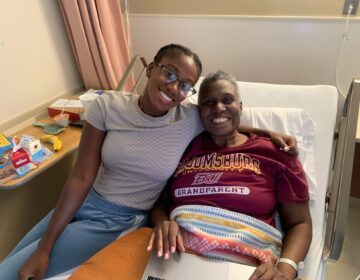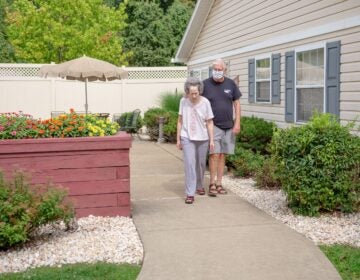New Medicare dementia program offers free, enhanced support services to families in Pennsylvania, New Jersey and Delaware
The GUIDE program pays local health and home care organizations to provide free dementia respite services, education, training and care coordination.
Listen 1:14
A caregiver helps an older adult. (Rido81/Bigstock)
From Philly and the Pa. suburbs to South Jersey and Delaware, what would you like WHYY News to cover? Let us know!
When Chris Campbell meets families seeking home care services for a loved one with dementia, it’s often after that person has suffered a serious injury, accident or other trauma related to their deteriorating condition.
By the time a spouse, an adult child or another family member makes it to Campbell’s home care agency, Right At Home Jenkintown, he said caregivers experience burnout and are no longer able to support their loved one at home on their own.
“When you’re dealing with somebody with dementia, that’s a 24/7 thing a lot of times,” he said. “And if you don’t take care of yourself, this gets really complicated.”
Sometimes, there’s a financial barrier to accessing support services earlier, which can be costly with or without insurance. Family members might also be reluctant to relinquish some caregiving duties, even when they become overwhelming, Campbell said.
“They’re fiercely independent, and acknowledging the fact that they need help with their loved one is, in their minds, maybe failure at times,” he said.
He hopes that a new federal program called GUIDE will help more people overcome those barriers in order to access home care and support services earlier for dementia, which affects an estimated 6 million Americans.
“This is a gigantic population of people, both here in Pennsylvania as well as across the United States,” Campbell said. “So, there’s tons of people that are going to be able to benefit from this.”
The Guiding an Improved Dementia Experience, or GUIDE, Model is designed to benefit people with traditional Medicare health insurance who want to age in place at home while living with dementia.
GUIDE pays participating local health and home care organizations to provide dementia patients and their unpaid caregivers with an array of services that include respite care, education and training programs, 24/7 access to a care team of professionals, medication reviews and more, according to the Centers for Medicare and Medicaid Services.
All services offered through the program are fully covered by Medicare.
It means a family who previously struggled to pay for these services, or who lacked the knowledge and training on how to find these resources and coordinate care for a loved one, can now get help with all of that from assigned navigators and care teams.
The federal pilot program, first launched last summer with about 100 participating organizations nationally, expanded this past July to include a total of 330 organizations, including several in Pennsylvania, New Jersey and Delaware.
Organizations are also subcontracting with partnering agencies like ComForCare, which has home care teams throughout the country, to deliver respite care and on-the-ground support services.
“When things get a little bit harder to do on your own, that’s where we’re coming in to support them,” said Stephanie Wierzbicka, director of strategic health care programs for ComForCare Franchise Systems.
In addition to respite services, home care agencies can offer assistance with dressing, bathing, eating, companionship, light housekeeping, meal preparation and transportation to medical offices, hair appointments and other errands.
Wierzbicka said the GUIDE program is bringing together health organizations, home care agencies and other providers to better coordinate care for people and families with dementia in a way that she hasn’t seen before.
“There’s a much more concerted effort behind supporting them in the process and trying to make sense of it so we can best support these older adults,” she said.
At ComForCare Home Care in Montgomery County and Philadelphia, agency owner Cassandra Bennett helps people enroll in the program.
Eligible participants will get personalized care plans and a dedicated care coordinator, which can remove some of that burden and responsibility from a caregiver’s shoulders, said Bennett, who added that feedback from families has been positive so far.
“Families tell us they feel assured or reassured knowing that they don’t have to navigate dementia alone,” she said. “I think that was one of the biggest components with caregivers, especially understanding the value of the resources and the relief that GUIDE provides.”
Enrollment in GUIDE is on a rolling basis. The model is set to run for eight years and is funded through 2032.
WHYY is your source for fact-based, in-depth journalism and information. As a nonprofit organization, we rely on financial support from readers like you. Please give today.





